Linnea Tanner's Blog, page 34
October 13, 2021
MICHEÁL CLADÁIN AFTER GÁIRECH COFFEE POT BOOK CLUB BLOG TOUR #HISTORICALFICTION #BLOGTOUR #COFFEEPOTBOOKCLUB @PHIL_HUGHES_NOV @MARYANNEYARDE
It is my pleasure to feature Micheál Cladáin as part of The Coffee Pot Book Club Blog Tour being held from October 11th – October 22nd, 2021. Micheál Cladáin is the author of the Historical Fiction, After Gáirech, which was released by PerchedCrowPress on September 30th, 2021 (370 pages).
Below are highlights of After Gáirech, Micheál Cladáin’s author bio, and an excerpt from his book.

To follow the blog tour, Click Tour Schedule Page
HIGHLIGHTS: AFTER GAIRECH
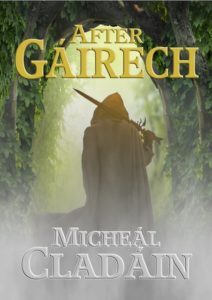
After Gáirech
By Micheál Cladáin
The battle of Gáirech is over; the armies of Connachta, Lagin, and Mumu are destroyed! Survivors are ravaging The Five Kingdoms of Ireland!
While working to resolve the Kingdoms’ issues and bring peace, Cathbadh is murdered, dying in his son Genonn’s arms. Genonn vows to avenge the death of his father.
For his revenge to work, he needs Conall Cernach and the Red Branch warriors of Ulster. But Conall is gone, searching for the head of Cú Chulainn. Genonn sets out to find him, aided by the beautiful Fedelm, the capricious Lee Fliath and the stalwart Bradán.
Buy Links:
Available on KindleUnlimited.
Amazon UK  Amazon US
Amazon US  Amazon CA
Amazon CA  Amazon AU
Amazon AU

Micheál Cladáin studied the classics and developed a love of ancient civilizations during those studies. Learning about ancient Roman and Greek cultures was augmented by a combined sixteen years living in those societies, albeit the modern versions, in Cyprus and Italy. As such, Micheál decided to write historical fiction, trying to follow in the footsteps of such greats as Bernard Cornwell and Conn Iggulden. Because of his Irish roots, he chose pre-Christian Ireland as his setting, rather than ancient Italy or Greece.
Micheál is a full-time writer, who lives in the wilds of Wexford with his wife and their border terriers, Ruby and Maisy.
Social Media Links:
Twitter  Facebook
Facebook  Amazon Author Page
Amazon Author Page
The wind blew from the north.
After pulling up his hood, Genonn wrapped his arms around his chest. Despite the approach of summer, the sudden cold caused an evening veil of mist and dampness. He wondered if the battle had angered the Three Sisters before realising it was a sentiment more in line with how Fergus would have thought. He shivered and shook his head, dreams of spit-roasted beef being crushed by foolish pride caused a brief smile.
No meat, just damp and cold, he thought. You let the old madman get to you. Again. ‘This is not cold,’ he hissed. Fergus would be cold, covered in sod and a cairn raised in payment for his stupidity. The warrior with a very sharp sword and very dull wit.
He crouched and vigorously struck iron against flint, trying to light his fire and cursing the stubbornness of the kindling, which did not offer the smallest tendril of hope.
‘Tuatha take this damp,’ Genonn hissed as he threw his flint and iron into the loam. He could see nothing. Darkness had shrouded the trees quicker than he would have thought possible. The light in the clearing would not last much longer. Realising he needed the fire lit while he could still see, he started to grub about for the iron and flint.
The words, ‘Not good at that, are you?’ caused him to start and look up into the cloak of shadows, which were hiding the speaker and causing his pulse to throb.
Genonn’s forestry had never been his strength, but still, he cursed himself as a fool for not hearing the approach. He could die in this clearing, and no one would know. I doubt he would care, a thought that flared before he suppressed it.
‘Who is there?’ he asked while grasping the hilt at his waist. It was scant comfort. An iron ball would kill him before he could use it against a slinger.
There was a long pause, during which he thought he could hear whispering but was not sure. Finally, the detached voice said, ‘It’s me, Lee Flaith. Me da used to be High King.’
Used to be High King? Does he mean he’s the son of Conaire? Genonn shook his head.
‘You cannot be. Lee has been dead these past seven, or is it eight, years. He died with King Conaire at Glencree, killed during the invasion.’ There was another long pause punctuated by what might have been more whispers.
‘Dead? No, not dead. Although sometimes I wish I were, the way the hag’s treated me.’
‘The hag?’ Genonn asked.
‘I won’t be called hag,’ another voice. Older; scratchy; explaining the whispers, if only partially. ‘And I fed you proper, so I did, so shut your hole before I give you a dig with me crann bagair.’
‘Aye, Niamh, who took me after the battle. Tied me to her belt and beat me with her cudgel for years. Taught me manners, so she says. Not sure I’ll have a use for them, but they’re on me like a cloak.’
Genonn could still not see anything of the speaker. He thought back to the blond youth who had been the High King of Ireland when a pirate invaded, turning the settlements red and orange with blood and flame.
‘Come and see if you have more luck lighting the fire,’ he said, keen to put eyes on this boy. ‘I have bread and cheese enough to share.’
‘The hag would be better,’ the boy said as he walked into the quickly darkening glade. ‘Better with a fire than I will ever be. Or you, come to that.’
Genonn relaxed. Whoever the boy was, he was barely into adolescence, tall, gangly, no threat.
‘A fire is a fire, regardless who lights it,’ Genonn said with a smile.
‘Watch who you call hag, bodalán. I won’t tell you again,’ threatened the old lady who followed the boy. She was waving a heavy stick for emphasis. Genonn could see how Lee would feel a rap with it for days.
The gloominess hid any detail of the speakers. All he could see was one was a young male and the other an old woman, cowled and hooded, protection from the cold, he supposed. Genonn stood, stamped his feet, and rubbed his upper arms. He could no longer see his breath steaming.
‘A fire would be most welcome. As I said, I can offer you hospitality. There is bread and cheese in my bag. As soon as the fire is lit, you can help yourselves.’
‘Don’t fret, old man. Hag’ll have a fire going in no time. Ow,’ the last because true to her threat, the woman had hit him. ‘Ow. Why the second rap?’
‘To be sure,’ said, as she began bustling around the glade, gathering the drier wood, taking kindling from a sack on her back.
‘Nothing easier than lighting a fire,’ cackled as she set about striking her flint. Genonn sighed when a few tendrils of hope curled up from the kindling. ‘Nothing easier,’ repeated while leaning in to blow the embers into flames.
When the fire gave enough light for him to see, Genonn could not believe what his eyes were showing him. A young Macc Cecht had returned from the dead, not a young Conaire.
‘So, tell me why I should believe you are son of Conaire.’
‘Can you not see the reincarnation sitting opposite?’ Niamh scoffed. ‘You won’t sit there and tell me he ain’t the spit.’
‘He has a look of Macc Cecht. Lee Flaith’s father was High King Conaire, not Macc Cecht.’
‘Aye. And Macc Cecht was the High King’s da, so he was.’
Genonn shook his head, trying to see the truth of the woman’s words in her face, but her cowl and the shadows thrown by the fire revealed nothing. Her words did not make much sense to him. Macc Cecht was the king’s champion. How could he be his father? When he voiced his doubts, Niamh laughed and shook her head, staring into the flames.
‘I am the son of Conaire,’ the boy said. ‘I was at Da Derga’s hostel. When it was all but over, Macc Cecht took me out through a culvert.’
It sounded to Genonn as though he was repeating something by rote. There was no intonation. No expression. As if someone had told him what to say and then beat it into him. He gazed at the cudgel lying beside the crone and wondered if it had more of a function than just teaching the boy manners.
‘Macc Cecht died at the battle, ambushed on the rise at the back of the vale,’ Genonn said. While running like a coward, he did not add. ‘Where were you when he died?’
‘He took me deep into the forest. We found Niamh in a clearing sitting beside a fire just like this one. She took me so Macc Cecht could return to the battle and defend my father.’
‘Aye. Knew who he was, too. Although the warrior was upset to hear it. Almost hit me when I called him granddad. Not sure if he was conscious of ageing or angry about me knowledge.’
‘How could you know Macc Cecht was the king’s father?’ Genonn asked fighting with his urge to dismiss the claims out of hand.
‘No faith, you youngsters,’ Niamh said, turning his frown to a smile. No one had referred to him as a youngster for many a year. ‘I’m old, it’s true. Sometimes think me back is trying to become me front, but these old eyes were ever strong. The one was like a slightly distorted image of the other, as though reflected in a curved copper bowl. Any fool could have seen the parentage. Besides, I knew Meas Búachalla and she told me who she’d lain with.’
Genonn took out a hunk of bread and chewed on it thoughtfully. If Lee had returned from the dead, it could resolve many problems. The Five Kingdoms needed a High King to unite them. Hard times were pressing on the borders. The Romans had subjugated the Gauls and invaded Alba twice. The Romans are coming was Cathbadh’s oft-spoken prophecy. Only time stood as a defence against the coming invasion. Conchobar Mac Nessa was no longer a practical candidate, not after the two armies watched him run from battle.
‘What brings you to my fire, Niamh?’ he asked.
‘This is my fire, Druid. Left in your own care, you’d be freezing your magairlí off, cursing not paying attention to woodcraft when training on Ynys Môn.’
‘That is a point fairly given,’ he nodded, the image causing a smile to crease his face.
‘You might make a good justice of the people, but you’re a useless woodsman, so y’are.’
‘You know me, Niamh?’
‘Course I know you. I was bringing the brat to Dún Dealgan. Heard your da was there for the funeral of Mac Roi. Thought to bring this one back to where he belongs. Saw you on the road. Decided to stop by and say hello.’
 Instagram: @coffeepotbookclub
Instagram: @coffeepotbookclub
October 11, 2021
Welcome to Day 3 of #AGhostAndHisGold Blog Tour! @RobertaEaton17 @4WillsPub @4WP11 @RRBC_Org
You are in for a real treat for Day 3 of the 4WillsPub Blog Tour that features Roberta Eaton Cheadle and her book, A Ghost and His Gold. She also publishes under the name of Robbie Cheadle.
Roberta is known for posting recipes of scrumptious dishes associated with her books. Below is a recipe for rusks, a form of dried bread or cake. Also below are highlights of A Ghost and His Gold and Roberta Eaton Cheadle’s Author Bio. Follow along on the blog tour and leave a comment for a chance to win in the Giveaway
GIVEAWAYS: (4) e-book copies of A GHOST AND HIS GOLD
GUEST POST: ROBERTA EATON CHEADLEThe History of South African Rusks

Background
Rusks, a form of dried bread or cake, were historically a convenient way of storing preserving bread for long periods. The Afrikaner women made rusks for every journey by wagon into the interior of South Africa, and more were made at every uitspan or camp.
During the Second Anglo Boer War, rusks played a part in feeding the Boer commandos in the field. Boerebeskuitwere, were and still are, balls of yeast bread packed tickly into bread pans, baked, broken up into segments, and dried in the oven. Traditionally, they had no sugar.
The recipe for making beschuit, round slices of a very soft sweet bread, dried and stored in rolls, was brought to the Cape of Good Hope by the Dutch settlers. Rusks have been made in South Africa since the 1690s and during the 1700s, the settlers sold homemade rusks to passing ships on route to the East or back to Europe, and to expeditions into the interior of South Africa.
Recipe for buttermilk rusks
Ingredients:
1 kg of self-raising flour;
500 ml (2 cups) of buttermilk;
5 ml of salt;
2 large eggs;
200 ml white sugar; and
190 grams of melted butter.
Method:
Beat the eggs, sugar and buttermilk together using an electric mixer or handheld beater. Sift the flour and the salt together. Cut the egg mixture into the dry mixture using a round bladed knife. Gradually add the butter and knead it into the dough. This should take about 5 minutes. The mixture will go from being greasy to being nice and smooth and combined. Put the dough into two greased loaf baking tins and bake them in the oven at 180 degrees Celsius for 50 to 60 minutes until a cake tester comes out clean. Let the loaves cool slightly and turn them out onto a bread board. Slice the loaves into long oblongs. Lay the oblongs on trays and bake them in the oven at 100 degrees Celsius for four hours, turning them every 45 minutes or so. Cool on a wire rack and store in an airtight container. Rusks will keep for up to three months.

HIGHLIGHTS: A GHOST AND HIS GOLD

A Ghost and His Gold
by Roberta Eaton Cheadle
After Tom and Michelle Cleveland move into their recently built, modern townhouse, their housewarming party is disrupted when a drunken game with an Ouija board goes wrong and summons a sinister poltergeist, Estelle, who died in 1904.
Estelle makes her presence known in a series of terrifying events, culminating in her attacking Tom in his sleep with a knife. But, Estelle isn’t alone. Who are the shadows lurking in the background – one in an old-fashioned slouch hat and the other, a soldier, carrying a rifle?
After discovering their house has been built on the site of one of the original farms in Irene, Michelle becomes convinced that the answer to her horrifying visions lie in the past. She must unravel the stories of the three phantoms’ lives, and the circumstances surrounding their untimely deaths during the Second Anglo Boer War, in order to understand how they are tied together and why they are trapped in the world of ghosts between life and death. As the reasons behind Estelle’s malevolent behaviour towards Tom unfold, Michelle’s marriage comes under severe pressure and both their lives are threatened.
AMAZON OR OTHER PURCHASE LINKS:
AUTHOR BIO: ROBERTA EATON CHEADLE

Roberta Eaton Cheadle is a South African writer and poet specialising in historical, paranormal, and horror novels and short stories. She is an avid reader in these genres and her writing has been influenced by famous authors including Bram Stoker, Edgar Allan Poe, Amor Towles, Stephen Crane, Enrich Maria Remarque, George Orwell, Stephen King, and Colleen McCullough.
Roberta has short stories and poems in several anthologies and has 2 published novels, Through the Nethergate, a historical supernatural fantasy, and A Ghost and His Gold, a historical paranormal novel set in South Africa.
Roberta has 9 children’s books published under the name Robbie Cheadle.
Roberta was educated at the University of South Africa where she achieved a Bachelor of Accounting Science in 1996 and a Honours Bachelor of Accounting Science in 1997. She was admitted as a member of The South African Institute of Chartered Accountants in 2000.
Roberta has worked in corporate finance from 2001 until the present date and has written 7 publications relating to investing in Africa. She has won several awards over her 20-year career in the category of Transactional Support Services.
SOCIAL MEDIA LINKS:
Robbie Cheadle
Website  Blog
Blog  Goodreads
Goodreads  Twitter
Twitter
Roberta Eaton Cheadle
Website  Blog
Blog  Goodreads
Goodreads  Twitter
Twitter  Facebook
Facebook
To follow along with the rest of the tour, please visit the author’s tour page on the 4WillsPublishing site. If you’d like to book your own blog tour and have your book promoted in similar grand fashion, please click HERE. Thanks for supporting this author and her work!

October 7, 2021
Liz Harris Darjeeling Inheritance Coffee Pot Book Club Blog Tour #HistoricalFiction #HistoricalRomance #BlogTour #CoffeePotBookClub @liz.harris.52206 @coffeepotbookclub
It is my pleasure to feature Liz Harris as part of The Coffee Pot Book Club Blog Tour being held from October 4th – October 15th, 2021. Liz Harris is the author of the Historical Fiction / Historical Romance, Darjeeling Inheritance (The Colonials Series), which was released by Heywood Press on October 1st, 2021 (365 pages).
Below are highlights of Darjeeling Inheritance, Liz Harris’ author bio, and my review of her book.

To follow on the blog tour, CLICK Tour Schedule Page
HIGHLIGHTS: DARJEELING INHERITANCE

Darjeeling Inheritance
(The Colonials)
By Liz Harris
Darjeeling, 1930
After eleven years in school in England, Charlotte Lawrence returns to Sundar, the tea plantation owned by her family, and finds an empty house. She learns that her beloved father died a couple of days earlier and that he left her his estate. She learns also that it was his wish that she marry Andrew McAllister, the good-looking younger son from a neighbouring plantation.
Unwilling to commit to a wedding for which she doesn’t feel ready, Charlotte pleads with Dan Fitzgerald, the assistant manager of Sundar, to teach her how to run the plantation while she gets to know Andrew. Although reluctant as he knew that a woman would never be accepted as manager by the local merchants and workers, Dan agrees.
Charlotte’s chaperone on the journey from England, Ada Eastman, who during the long voyage, has become a friend, has journeyed to Darjeeling to marry Harry Banning, the owner of a neighbouring tea garden.
When Ada marries Harry, she’s determined to be a loyal and faithful wife. And to be a good friend to Charlotte. And nothing, but nothing, was going to stand in the way of that.
Buy Links:
Amazon UK  Amazon US
Amazon US  Amazon CA
Amazon CA  Amazon AU
Amazon AU

Born in London, Liz Harris graduated from university with a Law degree, and then moved to California, where she led a varied life, from waitressing on Sunset Strip to working as secretary to the CEO of a large Japanese trading company.
Six years later, she returned to London and completed a degree in English, after which she taught secondary school pupils, first in Berkshire, and then in Cheshire.
In addition to the ten novels she’s had published, she’s had several short stories in anthologies and magazines.
Liz now lives in Oxfordshire. An active member of the Romantic Novelists’ Association and the Historical Novel Society, her interests are travel, the theatre, reading, and cryptic crosswords. To find out more about Liz, visit her website at: www.lizharrisauthor.com
Social Media Links:
Website  Twitter
Twitter  Facebook
Facebook  LinkedIn
LinkedIn  Instagram
Instagram  Amazon Author Page
Amazon Author Page
 Darjeeling Inheritance by Liz Harris
Darjeeling Inheritance by Liz Harris
My rating: 5 of 5 stars
I usually do not read historical romance, but I found Darjeeling Inheritance by Liz Harris to be a multi-layered story about a young woman finding her place in a stratified colonial society. It is set in the backdrop of a 1930 tea plantation at the foothills of the Himalayas, which is rift with political unrest and inequities for women, hired help, and natives. The scene in the prologue, occurring in 1919, hints at the strong bond between a young girl, Charlie, and her father, who has tragically lost all of his sons in their childhood as a result of the harsh conditions of the country.
Chapter 1 picks up later in 1930, when Charlotte returns with a chaperone, Ada, to the family’s tea plantation after being educated in England. Upon her arrival, the assistant manager, Dan, sadly informs her that her father has just died. To her shock, Charlotte learns that she has inherited the entire estate. Her grieving mother presents two options only available to a single woman at that time: sell the estate or marry Andrew, the son of another plantation owner. Since childhood, Charlotte always held the same love for the estate as her father and refuses to sell it. Still, she wants to honor his wishes to marry Andrew, but first, wants to learn more about the tea business.
Dan graciously agrees to teach Charlotte about the operations, much to the chagrin of everyone around her. Determined, Charlotte endures the harsh conditions as she learns about planting, harvesting, and processing tea from Dan, who treats her more like an equal and becomes her close friend. Meanwhile, the true natures of Andrew and Ada, whom Charlotte considers a close friend, comes to light. Charlotte must make a final decision to set the date for the wedding as dark secrets bubble to the surface. Will she do as the colonized society expects— marry Andrew—or seek an independent pathway with Dan for whom she has a growing attraction?
Author Liz Harris has masterfully written a multi-layered historical romance containing elements of betrayal and debauchery in a colonized society hiding dark secrets in which natives are taken advantage of. As with all romances, the story focuses on the development of the romantic relationship that seems impossible between Charlotte and Dan in the stratified society. The dialogue captures the essence of the characters and the vivid description of the landscape foreshadows dangers lurking in the lush landscape. The depth of the story rises above most romances because it pulls no punches and honestly reveals the inequities in a colonized society. It also provides a well-researched background on how tea is planted, harvested, and processed for commerce. For these reasons, the story immediately hooked me and I eagerly read to the end to see if Charlotte defies expectations to find herself and true love.
I heartily recommend Darjeeling Inheritance for those who enjoyed reading a richly textured story about a young woman who defies cultural expectations in the midst of betrayal by those closest to her. The novel honestly depicts a colonized society that hides its abuses and dark secrets.

@coffeepotbookclub
October 5, 2021
Luciana Cavallaro The Guardian’s Legacy Book Review and Launch #HistoricalFantasy #ActionAdventure @ClucianaLuciana @linneatannner
It is my pleasure to feature Australian author, Luciana Cavallaro, and to announce the launch of her new Historical Fantasy, Action/Adventure book, The Guardian’s Legacy (Coin of Time Book 1). The e-book was released by Mythos Publications on October 5, 2021 (121 pages).
As we both share a love for mythology and ancient civilizations, I have followed Luciana Cavallero for several years and was excited to read the first book in her next Coin of Time series. Similar to her other books, The Guardian’s Legacy weaves Greek history and mythology into the modern-day story.
Below are highlights of The Guardian’s Legacy, Luciana Cavallaro’s author bio, and my review of her book.
HIGHLIGHTS: THE GUARDIAN’S LEGACY
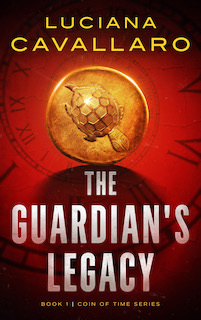
The Guardian’s Legacy
(Coin of Time Book 1)
by Luciana Cavallaro
An ancient cover-up, a dangerous legacy, and the search for the most powerful object.A three-thousand-year-old magical coin, the disappearance of an old man, fanatical neo-Nazis, and the hunt by Interpol, merge in this gripping story of an ancient cover-up, and the transition of an ordinary man into the guardian of the most powerful coin on earth.
High school teacher Nik Zosimos, leads an uncomplicated life until he receives a cryptic phone message from his grandfather, Iasos. He hurries to his grandfather’s finding him relaxed and pleased to see him. A few beers later, Nik leaves his grandfather’s place, stupefied and astounded. Iasos has a secret, one that dates back to the time of Herakles.
But that was just a myth, wasn’t it?
If you like Dan Brown and Wilbur Smith books or enjoys action, fast-past dramatic shows similar to National Treasure and The Librarians, then you’ll love The Guardian’s Legacy. Award-winning author of Historical Fantasy/Adventure, Luciana Cavallaro, pens a thrilling mystery. Click below on one of the retail sites to find out how Nik’s life changes.
Buy Links:
Amazon US  Amazon UK
Amazon UK  Amazon AU
Amazon AU  Amazon CA
Amazon CA  Smashwords
Smashwords  Barnes and Noble
Barnes and Noble  Kobo
Kobo
AUTHOR BIO: LUCIANA CAVALLARO

You can connect with her via:
Website  Twitter
Twitter  Facebook
Facebook  BookBub
BookBub  Amazon Author Page
Amazon Author Page  Goodreads
Goodreads
 The Guardian’s Legacy by Luciana Cavallaro
The Guardian’s Legacy by Luciana Cavallaro
My rating: 5 of 5 stars
Flip a coin and see where you land in the action/adventure book, The Guardian’s Legacy, by Luciana Cavallaro. This is Book 1 in the Coin of Time series that promises to be an action-packed tale with a likable hero reminiscent of Indiana Jones and Ben Gates in National Treasure. The prologue begins in a heart-throbbing chase scene in which Nik and a mysterious woman are being chased by assailants on motorcycles. With a flip of an ancient coin, Nik teleports back in time and meets the Greek historian, Herodotus. I asked myself, “Whoah! What just happened?” and was compelled to read the book to find out.
In Chapter 1, the story begins ten months earlier when we are introduced to an unmarried high school teacher, Nicolaos Zosimos (Nik), with an unremarkable life. He receives an urgent call from his grandfather who then urges him to be the next protector of an ancient coin minted by Heracles. At first, Nik wonders if his grandfather has lost his mind but reconsiders after seeing treasures of ancient weapons in his grandfather’s house. Further, his grandfather uses high-powered computers to search for clues where the second, identical coin might be. Together, the two coins have unknown powers that have been kept secret through the centuries in case they fall into the wrong hands. When Nik’s grandfather detects clues that the second coin has popped in and out of different shops in Europe, he travels there to investigate. When Nik flies later to Europe, he discovers his grandfather has disappeared. More alarming, Nik is being hunted by fanatical neo-Nazis and Interpol, forcing him into action to become the guardian of the most powerful coin in the world.
Author Luciana Cavallaro has written a gripping action-adventure that promises time travel and teleporting in the series. As with her other books, the tale contains a fascinating historical backdrop on how Heracles forged metals used to mint the coins. Details from Greek mythology and the development of minting coins are seamlessly weaved into the plot without distracting from the fast-paced plot. The story follows the traditional structure of Joseph Campbell’s The Hero with a Thousand Faces. The unlikely hero, Nik, is an ordinary man propelled into the role of a fierce protector of the ancient coin. The story ends on a climactic cliff-hanger. Lingering curiosity about the prologue compels me to read the entire series.
I highly recommend The Guardian’s Legacy for readers who enjoy action/adventure with an archaeological flair and the unique premise of discovering the secrets of two ancient coins that could destroy civilization if it flips into the wrong hands.
September 27, 2021
Nick Macklin Bloody Dominions Coffee Pot Book Club Blog Tour #HistoricalFiction #BlogTour #CoffeePotBookClub @NMacklinAuthor @maryanneyarde
I am delighted to feature Nick Macklin as part of The Coffee Pot Book Club Blog Tour being held from September 20th – October 1st, 2021. Nick Macklin is the author of the Historical Fiction, Bloody Dominions (The Conquest Trilogy, Book 1), which was released by Troubador Publishing on 28th June 2021 (368 pages).
Below are highlights of Bloody Dominions, Nick Macklin’s author bio, and an excerpt from his book.

Click Tour Schedule to follow the blog tour for Nick Macklin.
HIGHLIGHTS: BLOODY DOMINIONS

Bloody Dominions
(The Conquest Trilogy, Book 1)
By Nick Macklin
Journey with those at the heart of the conflict as Caesar embarks on the tumultuous conquest of Gaul 58-51 BC. Book One 58-56 BC.
As Caesar’s campaign begins, tests of courage and belief will confront the three protagonists, shaping them as individuals and challenging their views of the world and each other:
Atticus – an impetuous but naturally gifted soldier, whose grandfather served with distinction in the legions
Allerix – a Chieftain of the Aduatuci, who finds himself fighting both for and against Caesar
Epona – a fierce warrior and Allerixs’ adopted sister.
Experiencing the brutalities of conflict and the repercussions of both victory and defeat, Atticus, Allerix and Epona will cross paths repeatedly, their destinies bound together across time, the vast and hostile territories of Gaul and the barriers of fate that have defined them as enemies. In a twist of fate, Atticus and Allerix discover that they share a bond, a secret that nobody could ever foresee…
Trigger Warnings:
Violence, attempted rape.
Buy Links:
Universal link  Amazon UK
Amazon UK  Amazon US
Amazon US  Amazon CA
Amazon CA  Amazon AU
Amazon AU  Barnes and Noble
Barnes and Noble  Waterstones
Waterstones  Kobo
Kobo  iBooks
iBooks

A history graduate, Nick enjoyed developing the skills that would stand him in good stead during the extensive research he conducted prior to writing his novel. Whilst the ancient world unfortunately didn’t feature to any extent in his history degree, (the result of failing miserably to secure the A level grades that would have permitted greater choice) he maintained a lifelong and profound interest in ancient history and especially the Roman Empire, continuing to read avidly as he embarked on a career in HR. Over the next 30 years or so Nick occupied a variety of Senior/Director roles, most recently in the NHS. Unsurprisingly, writing in these roles was largely confined to the prosaic demands of Board papers but Nick never lost the long-harboured belief, motivated by the works of writers such as Robert Fabbri, Robyn Young, Anthony Riches, Simon Scarrow, Matthew Harffy and Giles Kristian, that he too had a story to tell. When he was presented with a window of opportunity c3 years ago he took the decision to place his career on hold and see if he could convert that belief into reality.
Nick always knew that he wanted to set the novel against the backdrop of a significant event/period in Roman history. Looking to narrow that down to something offering the potential for meaningful character and plot development, but that hadn’t already received exhaustive coverage, he settled on Caesar’s tumultuous occupation of Gaul. Spanning 8 years, the prolonged clash of cultures offered ample opportunity for the kind of dual perspective from which he was hoping to tell the story, whilst the violent conflict provided a wealth of exciting material to explore the changing fortunes of war and its impact at a personal level. The switching of allegiances, nations fighting for and against Rome also provided the potential for some intriguing plot lines. As his research unfolded, he was also struck by just how heavily the Roman psyche during this period was influenced by the scare they had received 50 years earlier when Germanic tribes invaded their territories and defeated their legions. Seeing references to the veterans of that war watching their sons and grandsons enlist for a similar campaign, he started to think about developing that link on both sides of the conflict. And so, the idea for the Conquest Trilogy was born.
In Bloody Dominions Nick has sought to produce a novel in which unfolding events are experienced and described from the perspective of protagonists on both sides of Caesar’s incursion into Gaul. Conscious that the role of women in Roman fiction, Boudica aside, is largely confined to spouse, prostitute or slave, Nick wanted to ensure that one of his lead characters was female and a prominent member of the warrior clan of her tribe. The novel is driven by these characters but the framework against which their stories unfold is historically accurate, featuring actual participants in Caesar’s campaign and drawing on real events as they occurred. As such Nick is genuinely excited about his characters and the story they have to tell.
Nick lives in Exeter with his two daughters and is currently juggling work as an Independent HR Consultant with writing the second novel in the Conquest Trilogy, Battle Scars.
Social Media Links:
Twitter  LinkedIn
LinkedIn  Goodreads
Goodreads  BookBub
BookBub
Watching from the edges of the hall, she had found the ceremony as moving as always, despite her inner turmoil. Wearing their polished mail and finest cloaks, her father and the members of the Royal Guard looked resplendent as they stood, swords drawn, in a wide arc around Cottabus and Ambilo. She knew the sacred oath by heart and had recited it as each of them was called forward by Epomedius to kneel and swear allegiance to her father. They had then run the dagger he offered across their palms and sealed their oath in blood. Failure to honour that oath would bring forth punishment from the gods, although she doubted any member of the Guard would see fit to delegate that task if one of their number failed to do their duty. Usually, the ceremony would be followed with a period of feasting but this time that would have to wait. Preparations were being made for her father’s departure tomorrow. No doubt a beaker or two of ale would be taken in lieu of the feast but she would leave them to it. Epomedius’ voice boomed out as she tried, unsuccessfully, to sneak away.
“Epona! Stop skulking in the shadows. The king requires your presence.”
Slightly surprised by the formality of the reference to her father, she turned and made her way across the hall. Her father, Allerix and Epomedius came forward to meet her, leaving the rest of the Guard, now supplemented by its two new members, in situ. She inclined her head deferentially.
“Father.”
He gave her a smile but it was Epomedius who addressed her.
“Your father knows that if war is declared, you would commit to fighting in the ranks. He would expect nothing less. None of us would. But he cannot allow it. It would be inappropriate.”
She struggled to make sense of what she was hearing. Surely her father wouldn’t deny her that right? He couldn’t. She looked at him plaintively but he remained stony-faced and unmoved. Her mind was filled with a multitude of angry questions. They hadn’t formed any sort of coherent argument but that wasn’t going to stop her protesting. She took a step forward. As if he had been anticipating her response, Epomedius raised his hand; his stern look a warning that she should stave off any outburst. Dejected but conscious of the many others in the room, she bit her lip and stepped back. She could feel her hands gripping the edges of her tunic but she kept her gaze fixed defiantly on Epomedius.
“It would be inappropriate because you do not best serve your king in that way. I would gladly welcome any other warrior possessing your level of skill and bravery into the Guard, as would your father. The king rides to Samarobriva tomorrow and the full Guard will accompany him. Only the Guard is not yet full.”
Filled with a rising sense of excitement and hope, she looked quizzically at her father.
“Father? What is he saying?”
He smiled.
“That we have one more oath of allegiance left to swear, if you would wish it so?”
Of course, she would wish it so! She couldn’t ever recall feeling so happy. Or so proud. All she wanted to do was shout her acceptance but, overwhelmed, she simply smiled and nodded her head. Allerix laughed.
“Well. That’s a first. I never thought anything would render you speechless.”
She quickly recovered her composure.
“Bastard! Did you know?”
He smiled.
“Of course. And a little more respect please for another member of the Guard.”
“She is not yet a member,” Epomedius interjected.
Her father nodded and gestured that Allerix and Epomedius should return to their places. She reached for her father’s arm.
“Are you sure? Won’t the elders be displeased that you have broken with tradition?”
Her father shrugged.
“Some of them, but I have spoken with enough. Besides, it’s my Guard. Why would I not have the most able in my service? That is the tradition we should uphold, I think. I am sure. Now, go.”
He set off to retake his position at the centre of the hall. Still scarcely able to believe what was happening, she hurried over to join Epomedius.
“You know the oath.”
“I do.”
“Then kneel and swear fealty to your king.”
Trembling slightly, she lowered her knee to the ground. She closed her eyes and took a deep breath.
“In the presence of my kin and before Taranis, I offer this sacred oath to faithfully serve my king, to never desert his service and give my life for his protection. This much I swear.”
Rising to her feet, she took the dagger from Epomedius, flinching as she ran the blade across her palm. But the pain was nothing compared to the sense of pride and honour that she was now feeling. She watched the blood trickle from her upturned hand onto the dagger. It was done. She was a member of the Guard. She had some unexpected arrangements to make for their departure tomorrow but perhaps she would stay for that ale after all.

Instagram: @coffeepotbookclub
September 21, 2021
Amy Maroney Island of Gold Coffee Pot Book Club Blog Tour #IslandOfGold #HistoricalAdventure #Rhodes #KnightsHospitaller #BlogTour #CoffeePotBookClub @wilaroney @maryanneyarde
It is my pleasure to feature Amy Maroney as part of The Coffee Pot Book Club Blog Tour being held from September 13th – September 24th, 2021. Amy Maroney is the author of the Historical Adventure and Romance, Island of Gold (Sea and Stone Chronicles), which was released by Artelan Press on September 8, 2021 (380 pages).
Below are highlights of Island of Gold, Amy Maroney’s author bio, and her guest post on what inspired her to write the book.

Click Tour Schedule
HIGHLIGHTS: ISLAND OF GOLD
 Island of Gold
Island of Gold
(Sea and Stone Chronicles)
By Amy Maroney
1454. A noble French falconer. A spirited merchant ’ s daughter. And a fateful decision that changes their destiny forever.
When Cédric is recruited by the Knights Hospitaller to the Greek island of Rhodes, his wife Sophie jumps at the chance to improve their fortunes. After a harrowing journey to Rhodes, Cédric plunges into the world of the knights—while Sophie is tempted by the endless riches that flow into the bustling harbor. But their dazzling new home has a dark side.
Slaves toil endlessly to fortify the city walls, and rumors of a coming attack by the Ottoman Turks swirl in the streets. Desperate to gain favor with the knights and secure his position, Cédric navigates a treacherous world of shadowy alliances. Meanwhile, Sophie secretly engineers a bold plan to keep their children safe. As the trust between them frays, enemies close in—and when disaster strikes the island, the dangers of their new world become terrifyingly real.
With this richly-told story of adventure, treachery, and the redeeming power of love, Amy Maroney brings a mesmerizing and forgotten world to vivid life.
Buy Links:
This novel is available on #KindleUnlimited
Universal Link  Amazon UK
Amazon UK  Amazon US
Amazon US  Amazon CA
Amazon CA  Amazon AU
Amazon AU

Amy Maroney lives in the Pacific Northwest with her family, and spent many years as a writer and editor of nonfiction before turning her hand to historical fiction. When she’s not diving down research rabbit holes, she enjoys hiking, dancing, traveling, and reading. Amy is the author of the Miramonde Series, a trilogy about a Renaissance-era female artist and the modern-day scholar on her trail. To receive a free prequel novella to the Miramonde Series, join Amy’s readers’ group. CLICK Website
Social Media Links:
Website  Twitter
Twitter  Facebook
Facebook  Instagram
Instagram  Pinterest
Pinterest  Book Bub
Book Bub  Amazon Author Page
Amazon Author Page  Goodreads
Goodreads
Hello Linnea! Thanks so much for hosting me on your blog.
Island of Gold, the first book in my Sea and Stone Chronicles series, was inspired by a visit to the Greek island of Rhodes back in 2012. With my husband and two daughters, I got to know the island and its people over a period of three weeks. I was struck by the kindness of the Greeks we met, and by the layers of history stretching back thousands of years. Ancient temples and crumbling statues of Greek goddesses existed alongside walls and forts built by the medieval Knights Hospitaller of the Order of St. John during the medieval era.
[
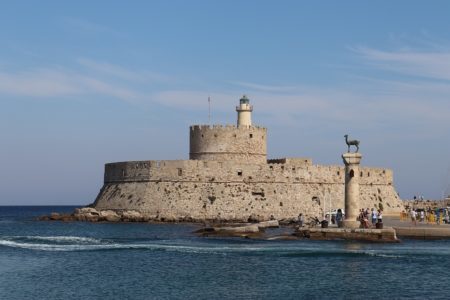
History Architecture Greece Castle Fortress Rhodes
During our stay there, I was fascinated to learn that Rhodes Town, the largest community on the island, has been a thriving port for millennia. In the medieval era, the Knights Hospitaller ruled Rhodes and the surrounding islands from a palace overlooking the bustling harbor. The knights were few in number—about three hundred knights lived in Rhodes Town during the mid-fifteenth century, when Island of Gold takes place—but they were supplemented by thousands of mercenary soldiers and bolstered by their powerful naval fleet. Their primary goal was to defend Christendom from Muslim forces in the East, both the Ottoman Turks and the Mamluks who ruled Egypt.
I remember exploring the vaulted corridors of the hospital that once served local people, Christian pilgrims en route to Jerusalem, and the knights themselves. The graceful stone arches gave no hint as to the original purpose of the building, but they were breathtaking. Exiting the hospital, we followed a narrow cobbled lane up a hill. Known as the Street of the Knights, it’s lined with lovely medieval structures that once served as “inns” that housed knights, pilgrims, and travelers.

Medieval Hospital in Rhodes Town, Unsplash Photo
At the top of the hill, we entered the rebuilt palace of the Order and wandered through vast, formal chambers. We peeked into dim corridors where stone tablets carved with European knights’ coats-of-arms leaned haphazardly against the walls. Staring at those forgotten slabs of stone, I found myself wondering who the knights had been, where they’d come from, how they’d died. I imagined their militarized world existing alongside the merchants, ship captains, and local Greeks who made up the population of Rhodes Town. What had it been like for ordinary people living in the knights’ shadow? For women, especially?
We strolled down the hill from the palace to the harbor, where seawalls stretch out from stone quays to embrace the waves. I watched sailboats cruise in from the sapphire-blue waters of the Aegean and imagined the past. Would merchant galleys six hundred years ago be powered by sails, by oars, maybe by both? Did the merchants and the knights get along? Did the locals resent the knights? Who benefited from the Order’s presence? Who suffered? The questions burrowed into my brain and never left.
Before we left, I bought a few souvenirs in Rhodes Town that are with me still. One is a lovely head of a goddess painted on a piece of driftwood by a Greek artist. I have a set of three tiny olivewood bowls that we use for nuts or other snacks, and a set of olivewood salad spoons. Every time I look at these items, I’m transported back to Rhodes.

Greek Goddess Painting, Photo by Amy Maroney
The truth is, Rhodes cast a spell on me a decade ago that only grew deeper as the years wore on. When I decided to write about the island and its history, I had no idea what an incredible journey of research lay ahead. The secrets of history I’ve shared in Island of Gold are just the beginning…there are many more voices and stories of the past waiting for their turn in the spotlight. And, in time, the Sea and Stone Chronicles will reveal them all

@coffeepotbookclub
September 12, 2021
Jenny Knipfer In a Grove of Maples Coffee Pot Book Club Blog Tour #HistoricalFiction #ChristianHistoricalFiction #BlogTour #CoffeePotBookClub @jennyknipferbrave @coffeepotbookclub
It is my pleasure to feature Jenny Knipfer as part of The Coffee Pot Book Club Blog Tour being held from August 23rd – October 25th, 2021. Jenny Knipfer is the author of the Historical Fiction / Christian Historical Fiction novel, In a Grove of Maples (Sheltering Trees: Book 1), which was released by the author on 1st July 2021 (264 pages).
Below are highlights of In a Grove of Maples, Jenny Knipfer’s author bio, and an excerpt from her book.

 In a Grove of Maples
In a Grove of Maples
(Sheltering Trees: Book 1)
By Jenny Knipfer
Audio Narrated By Jenn Lee
“… a heartfelt tale of the struggles of married life on a nineteenth-century farm. Edward and Beryl are both relatable and sympathetic. Knipfer expertly captures the emotion and stress of their lives and relationship. It’s a touching and realistic portrayal of love, loss, and friendship.” Heather Stockard for Readers’ Favorite five-star review
A HISTORICAL NOVEL OF THE PERILS OF NEWLYWED LIFE AND ALL THAT COMES TO DIVIDE LOVERS
In 1897 newly married Beryl and Edward Massart travel more than one thousand miles from Quebec to farm a plot of land in Wisconsin that they bought sight-unseen. An almost magical grove of maples on their property inspires them to dream of a real home built within the grove, not the tiny log cabin they’ve come to live in.
Misunderstandings and tempers get the better of them when difficulties and troubles arise. Just months after they wed, Edward leaves pregnant Beryl in the midst of the coming winter to tend the farm and animals while he goes to be a teamster at a northern Wisconsin logging camp.
Will Beryl and Edward walk into the future together to build their house of dreams in the grove of maples, or will their plans topple like a house of sticks when the winds of misunderstanding and disaster strike?
Readers of Christian historical fiction, Historical fiction, Women’s fiction, and Christian historical romance will be endeared to this slice of late 19th century farm life.
Buy Links Book:
Book is available on Kindle Unlimited
Universal Link  Amazon UK
Amazon UK  Amazon US
Amazon US  Amazon CA
Amazon CA  Amazon AU
Amazon AU  Barnes and Noble
Barnes and Noble  Indiebound
Indiebound  Bookshop
Bookshop
Buy Links Audiobook:
AUTHOR BIO: JENNY KNIPFER

Jenny lives in Wisconsin with her husband, Ken, and their pet Yorkie, Ruby. She is also a mom and loves being a grandma. She enjoys many creative pursuits but finds writing the most fulfilling.
Spending many years as a librarian in a local public library, Jenny recently switched to using her skills as a floral designer in a retail flower shop. She is now retired from work due to disability. Her educational background stems from psychology, music, and cultural missions.
She holds membership in the: Midwest Independent Booksellers Association, Wisconsin Writers Association, Christian Indie Publishing Association, and Independent Book Publishers Association.
Jenny’s favorite place to relax is by the western shore of Lake Superior, where her novel series, By The Light of the Moon, is set. A new historical fiction, four-part series entitled, Sheltering Trees, will be released in 2021 and 2022. Jenny is currently writing a novella series entitled, Botanical Seasons.
Social Media Links:
Website  Twitter
Twitter  Facebook
Facebook  Instagram
Instagram  Pinterest
Pinterest  Book Bub
Book Bub  Amazon Author Page
Amazon Author Page  Goodreads
Goodreads
April 1st, 1898
Dear Diary,
Today I found out that I am a fool, fitting for April Fool’s Day. I am a fool for thinking I could: live this farming life; tolerate being alone; be strong and courageous enough; not give in to what I crave—love and affection.
Why does Edward never sign his letters with “I love you”? Instead, he scrolls his salutation out with the words “Your husband,” as if I need to be reminded of who he is. Perhaps I do, for I’ve forgotten what his presence feels like, what it means for him to be my husband. Husbandry signifies care and tending, but he is far away. I’ve not been tended to. I feel like I have been forgotten.
Maybe I am being too harsh on Edward. I try to recall the precious moments shared between us, but they are few. Separation and grief have faded them.
I ask myself why I should not accept who is here, with arms open wide to comfort me. I’m afraid my intuition has been right all along. Cedric loves me.

Instagram: @coffeepotbookclub
September 8, 2021
STEVE M. GNATZ THE WISDOM OF THE FLOCK COFFEE POT BOOK CLUB BLOG TOUR #HistoricalFiction #BlogTour #CoffeePotBookClub @maryanneyarde
It is my pleasure to feature Steve M. Gnatz as part of The Coffee Pot Book Club Blog Tour being held from September 6th – September 17th, 2021. Steve M. Gnatz is the author of the historical fiction novel, The Wisdom of the Flock: Franklin and Mesmer in Paris, which was released by Leather Apron Press on November 2020 (541 pages).
Below are highlights of The Wisdom of the Flock, Steve M. Gnatz’s author bio, and an excerpt from his book.

For a schedule of the complete blog tour, click Tour Schedule Page.
HIGHLIGHTS: THE WISDOM OF THE FLOCK
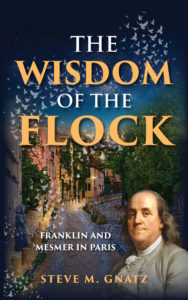
The Wisdom of the Flock
by Steve M. Gnatz
A WORLD OF ENLIGHTENMENT, REVOLUTION, AND INTRIGUE
1776: Benjamin Franklin sails to Paris, carrying a copy of the Declaration of Independence, freshly signed. His charge: gain the support of France for the unfolding American Revolution. Yet Paris is a city of distractions. Ben’s lover, Marianne Davies, will soon arrive, and he yearns to rekindle his affair with the beautiful musician.
Dr. Franz Mesmer has plans for Marianne too. He has taken Parisian nobility by storm with his discovery of magnétisme animale, a mysterious force claimed to heal the sick. Marianne’s ability to channel Mesmer’s phenomena is key to his success.
A skeptical King Louis XVI appoints Ben to head a commission investigating the astonishing magnétisme animale. By nature, Ben requires proof. Can he scientifically prove that it does not exist? Mesmer will stop at nothing to protect his profitable claim.
The Wisdom of The Flock explores the conflict between science and mysticism in a time rife with revolution, love, spies, and passion.
Trigger Warnings:
Mild sexual content
Buy Links:
Available on Kindle Unlimited.
Amazon UK  Amazon US
Amazon US  Amazon CA
Amazon CA  Amazon AU
Amazon AU  Barnes and Noble
Barnes and Noble  Waterstones
Waterstones
Book Trailer:
https://www.facebook.com/101810865019591/videos/3881313301879562
AUTHOR BIO: STEVE M. GNATZ
 Steve Gnatz is a writer, physician, bicyclist, photographer, traveler, and aspiring ukulele player. The son of a history professor and a nurse, it seems that both medicine and history are in his blood. Writing historical fiction came naturally. An undergraduate degree in biology was complemented by a minor in classics. After completing medical school, he embarked on an academic medical career specializing in Physical Medicine and Rehabilitation. There was little time for writing during those years, other than research papers and a technical primer on electromyography. Now retired from the practice of medicine, he devotes himself to the craft of fiction. The history of science is of particular interest, but also the dynamics of human relationships. People want to be good scientists, but sometimes human nature gets in the way. That makes for interesting stories. When not writing or traveling, he enjoys restoring Italian racing bicycles at home in Chicago with his wife and daughters.
Steve Gnatz is a writer, physician, bicyclist, photographer, traveler, and aspiring ukulele player. The son of a history professor and a nurse, it seems that both medicine and history are in his blood. Writing historical fiction came naturally. An undergraduate degree in biology was complemented by a minor in classics. After completing medical school, he embarked on an academic medical career specializing in Physical Medicine and Rehabilitation. There was little time for writing during those years, other than research papers and a technical primer on electromyography. Now retired from the practice of medicine, he devotes himself to the craft of fiction. The history of science is of particular interest, but also the dynamics of human relationships. People want to be good scientists, but sometimes human nature gets in the way. That makes for interesting stories. When not writing or traveling, he enjoys restoring Italian racing bicycles at home in Chicago with his wife and daughters.
Social Media Links:
Website  Blog
Blog  Facebook
Facebook  BookBub
BookBub  Amazon Author Page
Amazon Author Page  Goodreads
Goodreads
As Ben entered the Masonic Lodge of the Nine Sisters, he was almost bowled over by apprentices dashing around carrying every form of decoration for the ceremony. Golden compasses, swords, aprons, and amulets came out of their storage bins. These would be placed prominently to honor a great man tonight. Ben walked briskly across the expansive carpet of black and white squares toward the kitchen, seeking a glass of Madeira. He patted his inside coat pocket to reassure himself that he had not forgotten his notes for the eulogy he would deliver this evening. Under his left arm, he carried a satchel containing his black trousers and shirt, leather apron, and cap.
Ben entered the kitchen to find John Paul Jones and another man he recognized as Antoine Court de Gébelin sitting at a huge wooden table. De Gébelin was a gaunt, sickly appearing fellow with a complexion the color of gray clay. Both men were already dressed completely in black for the occasion. Jones wore his naval cap, but De Gébelin sported a dark red fez embroidered with the traditional compass and square motif. In front of the two men lay an array of Tarot cards.
“You possess many batons, my friend, which foretell success, advantage, and fortune,” de Gébelin was expounding as Ben approached. The young naval officer appeared to be enthralled.
“Superstitious nonsense,” Ben said.
John Paul jumped up as if Ben had caught him with his pants down once again.
“Hello, Ben,” he said sheepishly.
“Brother Jones, you should know better than to believe in such mystical fabrications,” Ben admonished.
“I resent that, Brother Franklin,” de Gébelin said. A pained look came over his face. “I have gone to great lengths to document the ancient Egyptian knowledge locked in these cards.”
“Excuse me, Brother de Gébelin,” Ben said. He was only slightly apologetic. “I do not mean to impugn your character or your work, but I am unconvinced of the scientific basis of these cards—especially any ability you might claim for them to foresee the future.”
Ben walked over to the cupboard, withdrew a crystal snifter, and poured a good measure of Madeira from the decanter on the table. The vessel was already more than half empty.
“However, if you two drink any more of this, I can foretell your future,” Ben said.
He put his fingers to his forehead and closed his eyes. “I predict that you will be retching up your guts before supper.”

Instagram: @maryanneyarde
September 2, 2021
Craig R. Hipkins Clement: The Green Ship #HistoricalFiction #Medieval #YA #BlogTour @CraigHipkins @maryanneyarde
It is my pleasure to feature Craig R. Hipkins as part of The Coffee Pot Book Club Blog Tour being held from August 31, 2021 to September10, 2021. Craig R. Hipkins is the author of the Historical Fiction/ Young Adult 12+ novel, Clement: The Green Ship (Clement, Book 2), which was released by Hipkins Twins Publisher on June 2, 2021 (313 pages).
Below are highlights of Clement: The Green Ship, Craig R. Hipkins’ author bio, and an excerpt from his book.

Click Blog Tour Schedule
HIGHLIGHTS: CLEMENT: THE GREEN SHIP
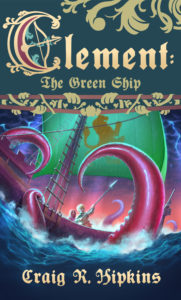 Clement: The Green Ship
Clement: The Green Ship
(Clement, Book 2)
By Craig R. Hipkins
Normandy. The year 1161.
King Henry ll sends the 14-year-old Clement, Count of la Haye on a secret mission. The young count and his friends travel in the wake of the mysterious mariner known as Sir Humphrey Rochford. Their destination? The legendary land of Vinland, known only from the Norse sagas. The journey is full of adventure and intrigue. Clement battles with a tyrannical Irish king and then finds his vessel attacked by a massive monster from the deep. The Green Ship sails to the sparse and barren land of Greenland where more trouble awaits.
Buy Links:
This novel is available to read on #KindleUnlimited
Universal Amazon Link  Amazon UK
Amazon UK  Amazon US
Amazon US  Amazon CA
Amazon CA  Amazon AU
Amazon AU  Waterstones
Waterstones

Craig R. Hipkins grew up in Hubbardston Massachusetts. He is the author of medieval and gothic fiction. His novel, Adalbert is the sequel to Astrolabe written by his late twin brother Jay S. Hipkins (1968-2018)
He is an avid long-distance runner and enjoys astronomy in his spare time.
Social Media Links:
Website  Twitter
Twitter  Facebook
Facebook  Instagram
Instagram  Pinterest
Pinterest  Amazon Author Page
Amazon Author Page  Goodreads
Goodreads
Clement felt the bottom of the skiff scraping sand and he leaped into the surf, knee deep, followed by Olaf. Almost immediately, they were surrounded by the fierce looking brute’s men who had drawn their swords and formed a circle around them. The brutish looking man was drawn to Jacques. Being by far the largest of the invaders, he was naturally assumed to be their leader. The red-haired man was attempting to interrogate Jacques in the Gaelic tongue, which to everyone but Gorm seemed wholly unintelligible. Clement found himself face to face with the boy whom he had seen on the shore. The Irish lad was staring at him with a fierce look, as if he were itching to plunge his blade into the Norman boy’s heart at the first sign from his father. The two boys were nearly the same height but the Irish lad was much stockier, and Clement realized if they were to go toe to toe, he would have to outwit this boy using speed and brain power.
Clement attempted to turn and say something to the Gaelic leader but when he did, the boy in front of him grabbed him by the front of his cloak and held a dagger to his neck. Olaf started to draw his sword and come to Clement’s aid but his arms were immediately pinioned by two stout men, who quickly disarmed him. Things were about to escalate when suddenly Gorm, who was being ignored, let out a flurry of curses in the Gaelic tongue, which arrested all movement. For a few seconds, there was silence and then the red-haired brute turned to Gorm and started to laugh. Gorm was holding up his well weathered hands and began talking to the man in a mixture of Gaelic and Norman.
“So, you are Normans?” the Gaelic leader asked, astonishingly in perfect Norman. “Why didn’t you say so? We thought you were Norse.”
“Aye, sir. I be a Dane by birth,” Gorm said, “but sail under a Norman flag.”
“And you…old man…the leader?”
Gorm bowed. “No, sire. I am but a humble sailor, skilled in the language of your culture.”
“I am the admiral of this fleet!” Clement interrupted. “Now please order this boy to lower his blade. It feels too hot against my neck, and I think too highly of my neck to possibly lose it.”
“Tieg! Release him!”
The boy reluctantly lowered his blade, but his piercing green eyes remained fixed on Clement as if he were disappointed, he did not get to cut him.
Tieg’s father approached Clement, studying him carefully.
“You are the leader of this fleet of ships? A mere boy?”
Clement nodded. “I am Clement, Count de la Haye, son of Hugo. This is my fleet. I have arrived on your shore for two reasons. I seek an audience with the king known as Mac Lochlainn. But first, who is it I address? Tieg’s father, perhaps?” Clement asked sarcastically, glancing at Tieg with contempt.
The man grinned.
“Aye, I am Tieg’s father. My name is Padraig O’Kane, and if it is Mac Lochlainn you seek, you have arrived at the right time. I expect him on this very night.”
Clement glanced over at Olaf, who had been released and had his sword returned. Jacques was standing with the other three rowers, strong Norman men loyal to Clement, who were watching their hosts suspiciously.
“Paidraig O’Kane, we have journeyed far and wish to top off our water supply.”
Padraig nodded. “There is a spring that flows from the rocks.”
He whistled and pointed to a short stout man wearing a dirty white tunic. The man approached hastily and said something in Gaelic.
“Rory will show you where it is.”
Clement turned to Jacques and the three sailors.
“Jacques, can you see to it?”
“Yes, sire, consider it done, but it shall take some time. Being no quay to dock we will have to load the barrels on rafts and tow them.”
“Thank you, Jacques. Have Osment signal to the rest of the fleet. We will do one vessel at a time.”
Clement turned to his host, who was studying him carefully.
“I don’t understand,” Padraig said mystified.
“What is it you don’t understand, Padraig O’Kane?” Clement asked seriously.
“How is it a boy is given the command of such a fleet as this? How old are you? Twelve?”
“I am fourteen. My good friend Olaf, is fifteen and my other good friend, Gorm, is…well he might be sixty or eighty, but age is merely a number.”
“Then you are my son’s age,” Padraig said, pointing at Tieg, who was standing off to the side with a perturbed look, listening.
“The ship you see anchored closest to the shore is my own,” Clement stated. “The rest belong to King Henry. It is he who is responsible for us landing on your shore, but it is Mac Lochlainn whom I seek. I have a message to impart to him from my king.”
Padraig cocked a cynical eye. He wetted his lips and peered out at the quartet of vessels anchored in his bay.
“That is a marvelous looking specimen,” he said admiringly, gesturing toward the Green Ship. “I would give you a chest full of silver for it, Clement de la Haye.”
“And I would not sell it, Padraig O’Kane, but tell me…how do you speak our language?”
“I learned from a countryman, who landed on our shores during the time of the first King Henry. I was but a youth then. I traveled with him to Normandy and lived for half a dozen years among your people before returning to my native land. My wife, God rest her soul, hailed from that land of plenty.”
Padraig was looking beyond Clement toward the Green Ship and espied Dagena and Alice leaning on the rail.
“You have women on board your vessel, Clement de la Haye?”
Clement squinted into the morning sunlight. The bright rays caused the calm water of the bay to sparkle.
“Aye, the Lady Dagena and the Lady Alice.”
“Of good breeding?” Padraig asked rudely.
Clement’s head turned sharply toward his host.
“Explain yourself, sir?”
“Are they of noble blood?”
“Yes,” he lied, thinking of Dagena. He almost immediately regretted divulging this to the Irishman. There was something about him he did not trust. What if he had ill intent? He trusted that Osment and Pierre would post a strong guard on the vessel and see to its security, but he was still concerned. Padraig O’Kane could muster hundreds of men if he were so inclined. What if he decided to make a night attack on the ship?
“Well, then! Let us tarry on this shore no longer, Clement de la Haye. It is not often we have amiable guests not concerned with plunder.”
He turned to one of his trusted men and whispered something in his ear. Clement walked with his host. Olaf and Gorm followed. Tieg and a few of Padraig’s men took up the rear at a distance. They scaled a narrow path, lined by rocks and thick brambles, that led up the cliff to the castle.

@maryanneyarde
August 25, 2021
Author Event Linnea Tanner 2021 Colorado Springs Comic Con @cscomiccon
Get ready for the 3-day event—Colorado Springs Comic Con—the biggest and best pop culture convention in the city. This will be my first event as an author since the start of the pandemic. And I’m excited. I’ll be joined by two other YA Fantasy authors (Ryanne Glenn and Nicole Davis) under the sponsorship of Apollo Raven Publisher, LLC. For science fiction, fantasy, and speculative fiction lovers, it’s a weekend not to be missed.
The fun-fill event will feature celebrities from all genres of TV, movies, and cartoons, some of the best names in the comic art community, as well as some of the best vendors in the area with those hard-to-find toys, comics, collectibles, and books.
Be sure to stop by at Booth 1311. We would love to chat with you. You can purchase signed paperbacks from each of the authors. Finish your wish list and even meet some of your favorite celebrities and get their autographs at this amazing event, now in its fifth year.
Where:
The Broadmoor World Arena
3185 Venetucci Blvd
Colorado Springs, CO
Times:
Friday, August 27th: 2 pm – 9 pm (1st hour VIP and Advance Purchases)
Saturday, August 28th: 9am – 7pm (1st hour VIP and Advance Purchases)
Sunday, August 29th: 9 am–5pm (1st Hour VIP and Advance Purchases)
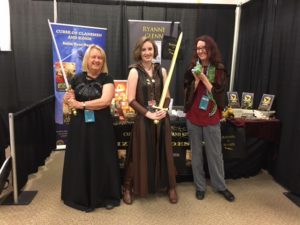
Linnea Tanner, Ryanne Glenn, and Nicole Davis 2019 Colorado Springs Comic Con
Watch Sword Fight between Authors Linnea Tanner and Ryanne Glenn at 2019 Colorado Springs Comic Con
nbsp;
Tribute to ReadersBelow is a tribute to the wonderful readers who stopped by my booth at the 2019 Colorado Springs Comic Con. I loved meeting and speaking with each of these avid readers who purchased my books and graciously allowed me to photograph them. A Viking with an arrow shot through his heart also stopped by and allowed me to wield his sword. These events are great ways to celebrate and to meet new friends!
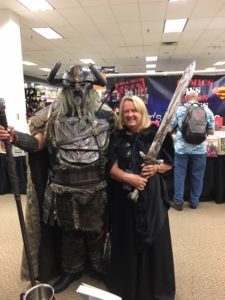
Linnea Tanner with Viking
Avid Readers at the 2019 Colorado Springs Comic Con





Thank you for your continued support. You rock my day!
Best wishes,
Linnea Tanner




